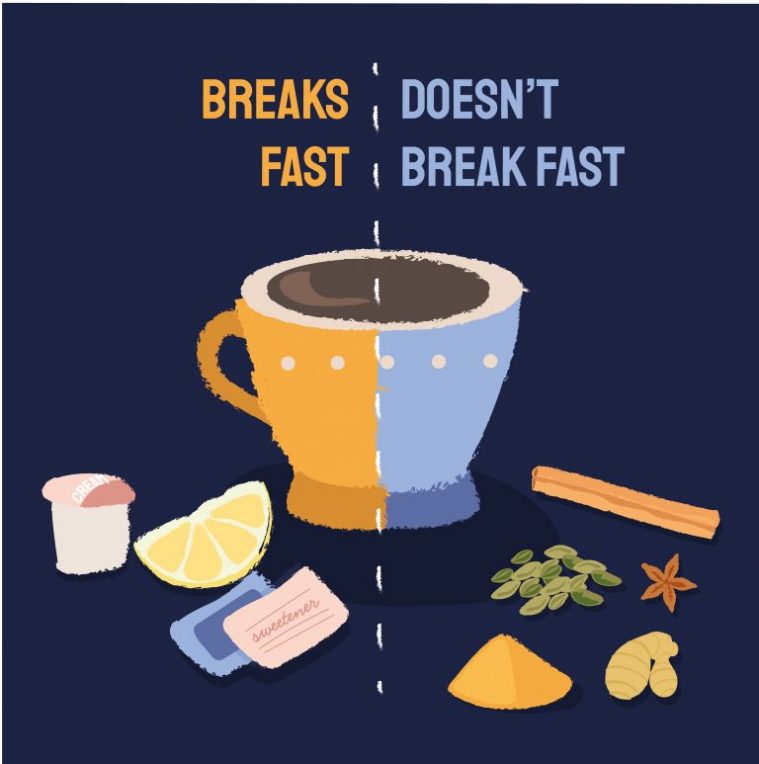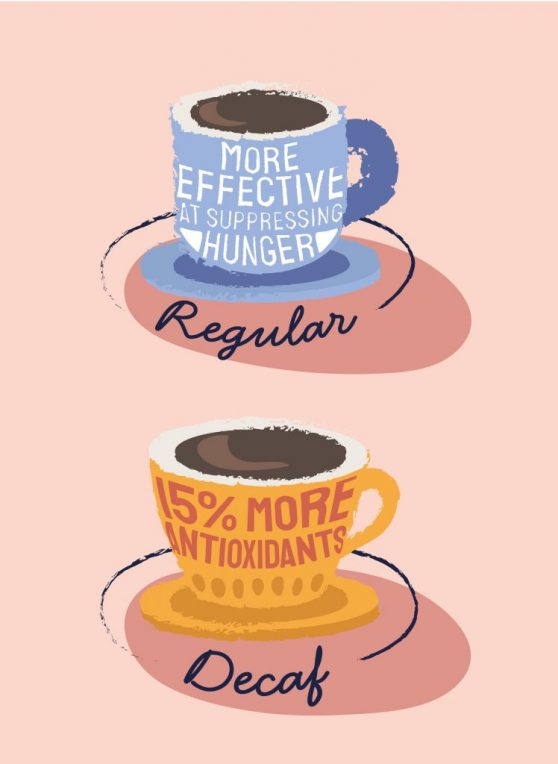Can You Drink Black Coffee While Intermittent Fasting
Coffee has a plethora of health benefits, and scientists say you can have up to four cups a day. But, you may have wondered if you can drink coffee during your fasting window. Like most things, there are benefits and risks to having a cup of joe during your fast.
Intermittent Fasting and Coffee: An Overview
You may take great comfort in your morning brew, and the pros more likely outweigh the caloric cons. But Doctors and Nutritionists agree, there's little risk involved if you drink coffee while you fast, as long as you're mindful about your consumption.
Coffee Won't Disrupt Your Fast

Coffee, in and of itself, will not disrupt your fast. As long as you avoid sweeteners or other high-calorie, high-carb additives, the small pleasure of a cup of coffee can increase compliance with your fasting program.
Calories
Why won't coffee disrupt your fast? A cup of coffee contains 3-5 calories and minimal amounts of fat, protein, and minerals. That's not enough to cause your body to leave the fasting state.
Caffeine
A cup of coffee contains 80-100mg of caffeine. Studies show that consuming less than 400 mg of caffeine a day, roughly the equivalent of 4 cups of coffee, is entirely safe for most people.
Caffeine, per se, doesn't negatively impact your fast, and if you're new to fasting, you may find caffeinated coffee prevents the drowsiness that can occur during sustained periods without food.
Creamers and Sweeteners
While black coffee is harmless to your intermittent fasting protocol, you begin to walk a fine line when adding sweeteners and creamers. The proteins in milk, and of course any sugars, stimulate a spike in insulin, which will trigger a break in your fast.
Regarding artificial sweeteners, it may be best to avoid them. While current research indicates that use in small quantities may be ok, it is unclear how large amounts may impact your health over an extended period. If you do need a little sweetness in your life, you can use some artificial sweeteners without breaking your fast but not all of them.
Compliance and Control
When your reach for a cup of coffee, or any food or drink, mindfulness is key. If you can't drink your coffee black, for example, do you actually want the coffee? Or is it an attempt to curb your hunger or an excuse to grab something sweet?
You may find a cup of coffee helps you stick with your fasting regimen, others it could trigger cravings. Pay close attention to what drinking coffee triggers in you.
Coffee and Intermittent Fasting: Shared Benefits
If you're a coffee lover, you'll be glad to hear the benefits of drinking coffee go beyond the satisfaction of holding a warm cup in hand on your morning commute. Intermittent fasting and drinking coffee have several similar benefits.
Weight Loss
Weight loss may be your main reason for fasting. Your fasting regimen will help balance your energy spent with the energy you consume, but your caffeinated coffee will too. Recent studies reveal caffeine increases energy expenditure and decreases energy intake, which will help you manage your weight.
Ketosis
The energetic boost caffeine provides may be due in part to ketones. Research indicates caffeine may produce ketones in your brain, which you can use as a source of energy when glucose is unavailable. Fasting is yet another mechanism through which the body reaches ketosis. When it comes to promoting ketosis, your morning cup of joe won't hurt your fasting protocol by any means.
Brain Health
The presence of ketones are especially important as you age, since glucose uptake in your brain decreases over time. Caffeine, when used in moderation, appears to be able to boost your mood, promote cognitive success, and has reduced the risk of mental decline like Alzheimer's disease or Parkinson's. Caffeine, as with intermittent fasting, can give you a sense of well-being, alertness, and concentration.
Insulin Sensitivity
Similarly to intermittent fasting, caffeine intake may also improve your glucose intolerance and insulin sensitivity in the long run. Scientists are still studying the underlying mechanisms that explain this effect, but regular coffee consumption appears to reduce your risk of type 2 diabetes by up to 42%.
In the short term, caffeine has the opposite effect; it will reduce your insulin sensitivity, and your glucose intolerance will rise. So, it may be best to drink your coffee without food.
Inflammation
Both intermittent fasting and coffee consumption can reduce your inflammation; coffee contains polyphenols and several anti-inflammatory elements that may contribute to this effect. Interestingly, caffeine supplements don't produce this effect. If you always thought your cup of coffee was special, you were right!
Autophagy
Autophagy is a naturally occurring process that clears your damaged cells to make way for new cell production. An increase in autophagy may be one of the primary reasons you like to fast.
Coffee also promotes autophagy. A recent study observed an increase in autophagy throughout the heart, muscles, and liver.
Appetite
Some coffee drinkers claim the drink's appetite-suppressing effects help them comply with their intermittent fasting protocol. This may be true for some, it's not right for everyone. Science has yet to associate coffee with appetite suppression. Whether or not coffee works will have that effect on you could be related to your genes, how you metabolize caffeine, and your aversion to bitter tastes.
Coffee While Intermittent Fasting: The Risks
There are very few risks of drinking coffee while doing intermittent fasting, and these risks are generally related to high caffeine intake.

Caffeine and Sleep Disturbance
Intermittent fasting improves the quality of your sleep, yet too much coffee can interfere with this. Doctors suggest limiting your coffee consumption to 4 cups per day. If you're sensitive to caffeine, avoid drinking coffee in the afternoon and evening. The general rule of thumb is to keep a space of six hours between your last dose of caffeine and the time you go to sleep for the night.
Sleep is crucial, and if you get too little sleep you'll feel miserable, and it will reduce the impact of your intermittent fasting regimen, which could cause you to gain weight.
Caffeine on an Empty Stomach
If you drink coffee on an empty stomach, it can exacerbate issues if you have inflammatory bowel disease, irritable bowel syndrome, or gastroesophageal reflux disease. If you're dealing with any of these issues, you may want to be careful with your intake, or try a cold brew, which is generally less acidic.
Switch to Decaf
The increase in insulin sensitivity, and an uptick in autophagy are true for both decaf and regular brews. If it's coffee you love, but the caffeine isn't working, you're not missing out by switching to decaf.
If You Must Drink Coffee During a Fast
If you simply can't live without your cup of joe, you don't have to. But there are some do's and don't so you don't break your fast.
Coffee Creamer Dos and Don'ts
Black coffee during intermittent fasting is best. If that's not an option, a tiny splash of cream is OK, and it won't change how much fat you're burning. It might, however, slow the rate of autophagy.
Fat is a better option than cream, and will have a small effect on your blood glucose or insulin sensitivity. Bulletproof coffee and intermittent fasting are thus the perfect pair. Grass-fed butter and coconut oil add flavor and creaminess without causing metabolic changes that would disrupt your fast.
When ordering in a coffee shop, beware that the "cream" used is often a mix of milk and cream and not full fat. Protein and carbohydrates in milk can cause you to break your fast.
Bulletproof Coffee
Bulletproof coffee is a combination of black coffee, grass-fed butter, and medium-chain triglyceride oil (also known as MCT oil), all blended together to form a smooth and creamy latte-like beverage. There are many health claims surrounding bulletproof coffee, but there's no evidence to back up the claims.
Bulletproof coffee may be an option for you since fat has less impact on your blood sugar cream or sugar. It'll still affect your metabolism differently than if you opt for black coffee, but the effects will not be as significant. Plus, the added fat can help curb your hunger.
If you suffer from conditions such as high LDL cholesterol, hyperlipidemia, or elevated triglycerides, you should talk with your doctor before you drink high-fat beverages like bulletproof coffee.
Coffee Sweetener Do's and Don'ts
If you must have a little sweetness in your coffee, choose wisely. Sweeteners will break your fast by triggering insulin secretion. Artificial sweeteners such as Stevia, Swerve, Aspartame, and Splenda won't break your fast, since they don't seem to have an effect on insulin secretion or blood glucose. But, you may wish to avoid them for other health reasons.
Cinnamon won't break your fast, and it may increase insulin sensitivity. You can also add a little unsweetened cocoa powder or ginger to your brew.
Watch out for hidden sweeteners if you get your coffee from a coffee shop. Soy, rice, and nut milk alternatives are typically sweetened.
Coffee and Intermittent Fasting: The Verdict
If you enjoy coffee and it helps you maintain your fast, by all means, enjoy it! Be mindful of creamers, sweeteners and other additives, and don't overdo it. If coffee causes you to experience negative side effects, be best to abstain.
Author's bio

Sara-Mai is a writer who specializes in physical and mental health, nutrition, and fitness. She has 20 years of professional experience in the health and wellness industry and is a certified yoga instructor.
Can You Drink Black Coffee While Intermittent Fasting
Source: https://simple.life/blog/coffee-during-intermittent-fasting/